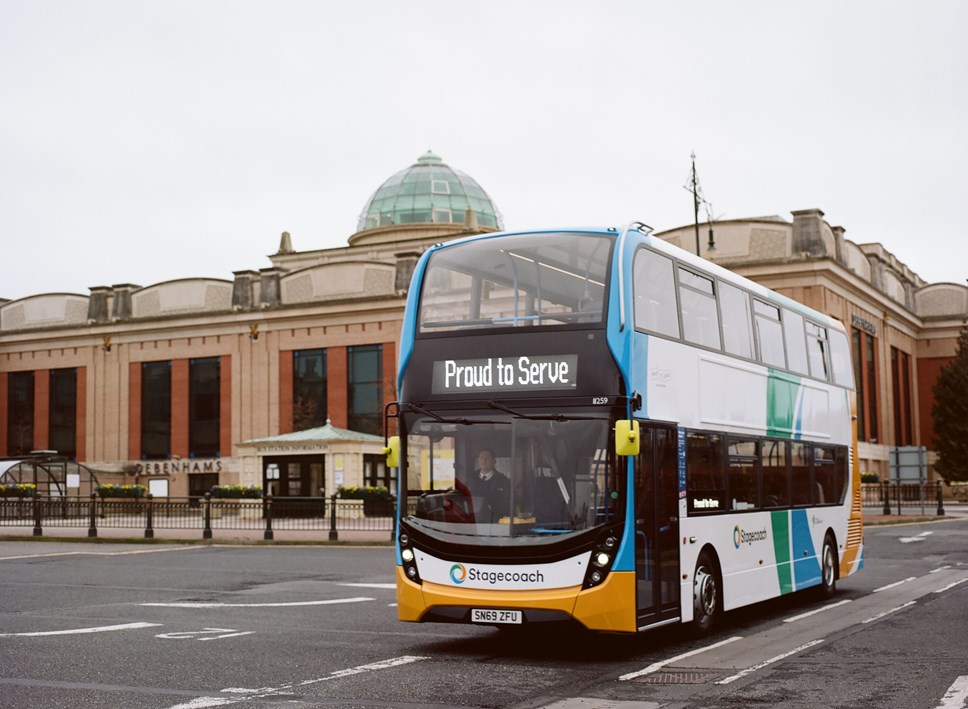
Stagecoach becomes first UK bus operator to invest in national roll-out of new bridge alert technology
- £4m project to strengthen existing safety measures to prevent bridge strikes
- Enhancement to GreenRoad’s leading driver safety and fuel-efficiency system
- Technology to cover 8,000 buses in England, Scotland and Wales by summer 2021
Stagecoach, Britain’s biggest bus operator, today (13 January 2021) announced that it will become the first bus operator in the country to invest in the national roll-out of new bridge alert technology across its fleet.
The £4m project will strengthen existing measures in place to prevent bridge strikes and build on Stagecoach’s industry-leading use of the GreenRoad driver safety and fuel efficiency system.
GreenRoad’s core safety system is installed on all of Stagecoach’s 8.000 buses in England, Scotland and Wales. The technology also serves professional drivers from companies across Europe, the Middle East, America, Australia and New Zealand.
Using a simple traffic-light-like LED system on the dashboard, the GreenRoad system gives drivers instant feedback about their driving manoeuvres, encouraging smoother, safer, more fuel-efficient driving that is more comfortable for passengers.
Stagecoach has been in discussions with GreenRoad over the past eight months on how to extend the telematics technology to further improve safety for its fleet - including 3,800 double-decker buses - around low bridges.
Data from Network Rail shows that there were 1714 railway bridge strikes across the country in the 2019-20 financial year. Most of these incidents involve heavy goods vehicles (HGVs), with between 40 and 50 a year related to buses.
As well as the potential for serious injuries, bridge strikes have significant financial and other costs for the country. On average, a single bridge strike costs more than £6,000 and in 2019-20 these incidents resulted in more than 7,800 hours of delays for rail passengers alone.
The intelligent GreenRoad system will use GPS vehicle location data and mapping services to alert the driver to nearby low bridges. If the technology determines that the bus is heading towards a low bridge, it will sound an in-cab alert, allowing a safe exit route that avoids the bridge.
Following a 16-week software development phase, the technology and associated speakers will be installed on Stagecoach buses across the country by summer 2021.
It will enhance a range of existing safety measures in place, including the design of bus routes to avoid low bridges, detailed classroom and practical route training for drivers, and ongoing work with authorities to ensure the placement of appropriate signage and other alerts.
Stagecoach Chief Executive Martin Griffiths said: “Everything we do starts with safety: for our customers, our people, pedestrians and other road users. Buses are already one of the safest forms of travel. But every year we invest millions of pounds in training our professional driving team and new technology to make our public transport operations even safer.
“Our country’s infrastructure includes many railway bridges designed in an era before modern transport vehicles went on the road, creating a safety risk. We have been working for many months with GreenRoad to design this important Low Bridge Alert enhancement to their proven safety technology, and are now implementing it to bolster the extensive measures we already have in place. We look forward to delivering the benefits from our investment across the country.”
The industry-leading initiative has been welcomed by Network Rail, which works with the Driver and Vehicle Standards Agency (DVSA), highways bodies, and road transport providers to help prevent bridge strikes.
Network Rail’s Chair, Sir Peter Hendy CBE, said: “Bridge strikes are an unnecessary burden on our railway. They pose serious safety risks, cause hours of delays for rail passengers and road users and swallow up public funds which should be used on upgrading and improving our network.
“We’ve seen encouraging signs of incidents declining recently thanks to our engagement work with industry partners, drivers and operators, as well as the introduction of technology which assists drivers, but the transport sector has to continue working together to make bridge strikes a thing of the past.
“I commend Stagecoach on taking the initiative with the roll-out of this technology and I hope to see other operators take a similar proactive approach to tackling the issue in the near future.”
Stagecoach’s bus drivers have been leading the way in GreenRoad’s global performance measurement programme for the past five years. More than 5,000 of Stagecoach’s 15,000 drivers have been awarded GreenRoad’s Fleet Elite status, reflecting the company’s approach to consistent improvement in safety and ongoing investment in driver training.
To gain Fleet Elite status, drivers must achieve an average of five or fewer events, such as harsh braking or acceleration, per 10 hours of driving over the entire calendar year. More Stagecoach employees have gained Fleet Elite status than any other company in the worldwide scheme.
David Ripstein, GreenRoad’s President & CEO, said: “We are pleased and honored to continue assisting Stagecoach in addressing some of its most significant safety challenges.
“We view ourselves as a safety technology leader that forms long-term partnerships with our customers, leveraging our best-in-class safety telematics solutions, together with our many years of experience, to help them reduce accidents, improve operations and minimise risk. We look forward to continued close cooperation to help Stagecoach reach the uncompromising standards of safety that they have set for themselves.”
ENDS
Contact Information
Emma Knight
Notes to editors
GreenRoad Technologies
- GreenRoad Technologies is a pioneering provider of comprehensive driver safety, operations management and fleet performance solutions. Its technology is currently used by hundreds of thousands of drivers throughout the world.
- GreenRoad’s solutions deliver a rapid ROI based on the significant reduction of fleet accident rates, fuel consumption/carbon emissions, maintenance, insurance expenses, improved customer satisfaction and more.
